新目标九年级英语学案(Unit 1 - 15全册)
- 格式:doc
- 大小:611.50 KB
- 文档页数:73
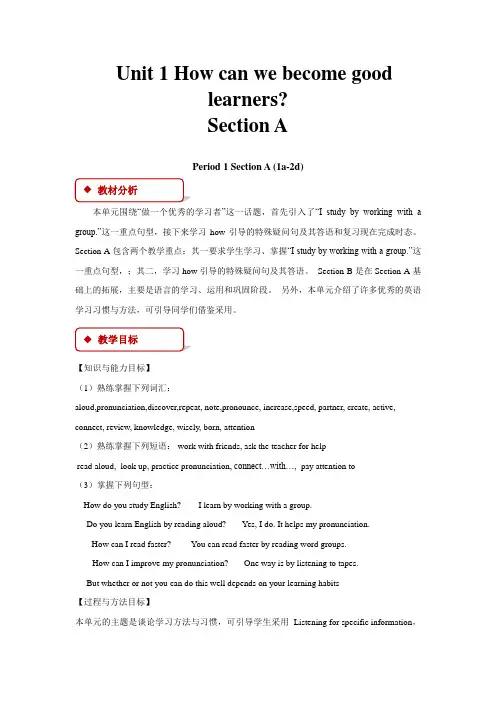
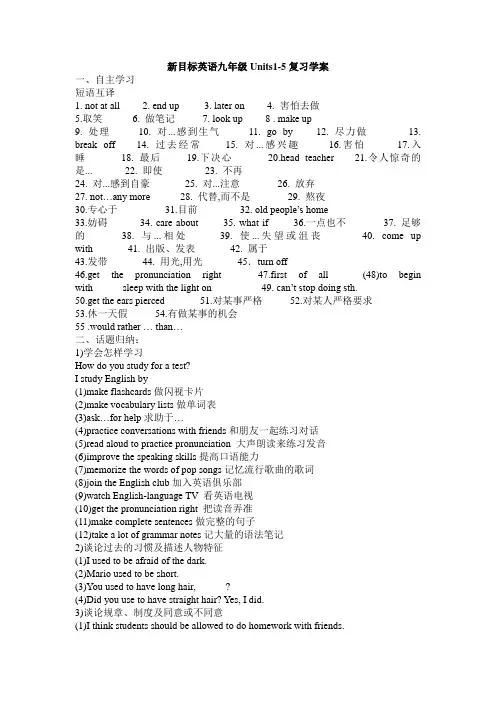
新目标英语九年级Units1-5复习学案一、自主学习短语互译1. not at all2. end up3. later on4. 害怕去做5.取笑6. 做笔记7. look up 8 . make up9. 处理10. 对...感到生气11. go by 12. 尽力做13. break off 14. 过去经常15. 对...感兴趣16.害怕17.入睡18. 最后19.下决心20.head teacher 21.令人惊奇的是... 22. 即使23. 不再24. 对...感到自豪25. 对...注意26. 放弃27. not…any more28. 代替,而不是29. 熬夜30.专心于31.目前32. old people’s home33.妨碍34. care about 35. what if 36.一点也不37. 足够的38. 与...相处39. 使...失望或沮丧40. come up with 41. 出版、发表42. 属于43.发带44. 用光,用光45.turn off46.get the pronunciation right 47.first of all (48)to begin with sleep with the light on 49. can’t stop doing sth.50.get the ears pierced 51.对某事严格52.对某人严格要求53.休一天假54.有做某事的机会55 .would rather … than…二、话题归纳:1)学会怎样学习How do you study for a test?I study English by(1)make flashcards做闪视卡片(2)make vocabulary lists做单词表(3)ask…for help求助于…(4)practice conversations with friends和朋友一起练习对话(5)read aloud to practice pronunciation 大声朗读来练习发音(6)improve the speaking skills提高口语能力(7)memorize the words of pop songs记忆流行歌曲的歌词(8)join the English club加入英语俱乐部(9)watch English-language TV 看英语电视(10)get the pronunciation right 把读音弄准(11)make complete sentences做完整的句子(12)take a lot of grammar notes记大量的语法笔记2)谈论过去的习惯及描述人物特征(1)I used to be afraid of the dark.(2)Mario used to be short.(3)You used to have long hair, ?(4)Did you use to have straight hair? Yes, I did.3)谈论规章、制度及同意或不同意(1)I think students should be allowed to do homework with friends.I disagree. They talk instead of doing homework.(2)Sixteen-year-olds should be allowed to drive.I disagree. They aren’t serious enough at that age.(3)Do you think sixteen-year-olds should be allowed to work at night?No, I don’t.4)谈论虚拟的情景(1)What would you do if you won a lottery?I’d give it to charities.(2)If I were you, I’d wear a shirt and tie.(3)If I were you, I’d take an umbrella.(4)对可能的情况进行推断)●Whose notebook is this?It might be Ning’s. It has her name on it.●Whose Fre nch book is this?It could be Ali’s. She studies French.●Whose guitar is this?It might belong to Alice. She plays the guitar.●Whose T-shirt is this?It can’t be John’s. It’s much too small for him.三、语法梳理1、动名词的用法:(1)动名词兼有动词和名词的特征,由动词加–ing 构成。
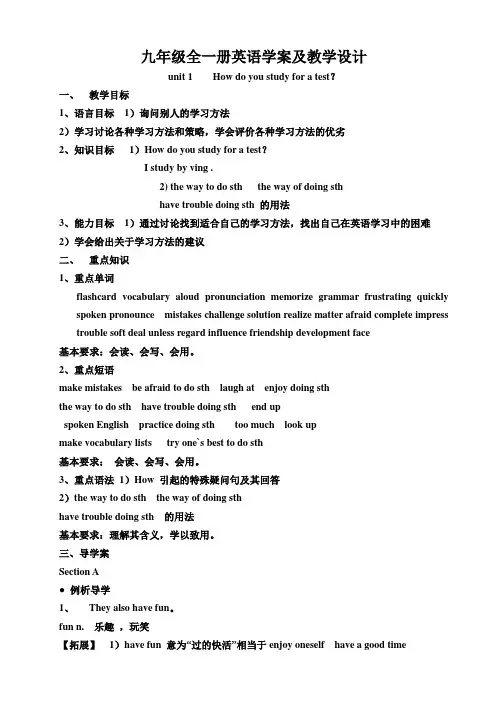
九年级全一册英语学案及教学设计unit 1 How do you study for a test?一、教学目标1、语言目标1)询问别人的学习方法2)学习讨论各种学习方法和策略,学会评价各种学习方法的优劣2、知识目标1)How do you study for a test?I study by ving .2) the way to do sth the way of doing sthhave trouble doing sth 的用法3、能力目标1)通过讨论找到适合自己的学习方法,找出自己在英语学习中的困难2)学会给出关于学习方法的建议二、重点知识1、重点单词flashcard vocabulary aloud pronunciation memorize grammar frustrating quickly spoken pronounce mistakes challenge solution realize matter afraid complete impress trouble soft deal unless regard influence friendship development face基本要求:会读、会写、会用。
2、重点短语make mistakes be afraid to do sth laugh at enjoy doing sththe way to do sth have trouble doing sth end upspoken English practice doing sth too much look upmake vocabulary lists try one`s best to do sth基本要求:会读、会写、会用。
3、重点语法1)How 引起的特殊疑问句及其回答2)the way to do sth the way of doing sthhave trouble doing sth 的用法基本要求:理解其含义,学以致用。
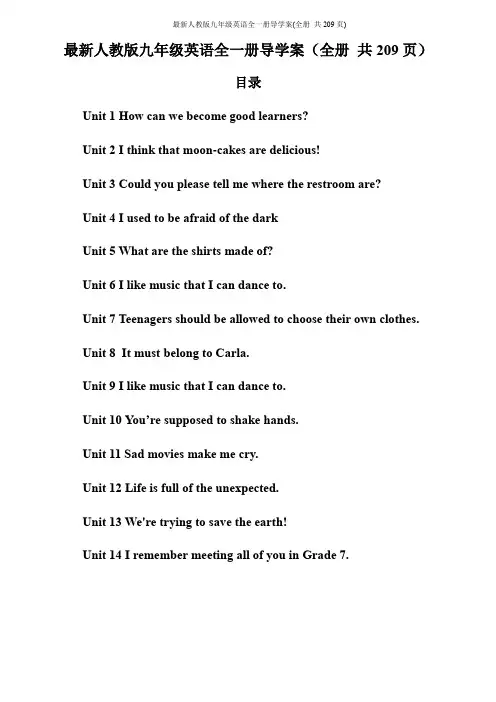
最新人教版九年级英语全一册导学案(全册共209页)目录Unit 1 How can we become good learners?Unit 2 I think that moon-cakes are delicious!Unit 3 Could you please tell me where the restroom are?Unit 4 I used to be afraid of the darkUnit 5 What are the shirts made of?Unit 6 I like music that I can dance to.Unit 7 Teenagers should be allowed to choose their own clothes.Unit8It must belong to Carla.Unit 9 I like music that I can dance to.Unit10You’re supposed to shake hands.Unit 11 Sad movies make me cry.Unit 12 Life is full of the unexpected.Unit 13 We're trying to save the earth!Unit 14 I remember meeting all of you in Grade 7.Unit 1 How can we become good learners?to be patient4. Try to guess a word’s meaning by reading the sentences before and after it.sentence n.Please use this word to make a sentence. make a sentence 五、练评(包含“考点链接” 应用探究 6分钟) 单项选择。
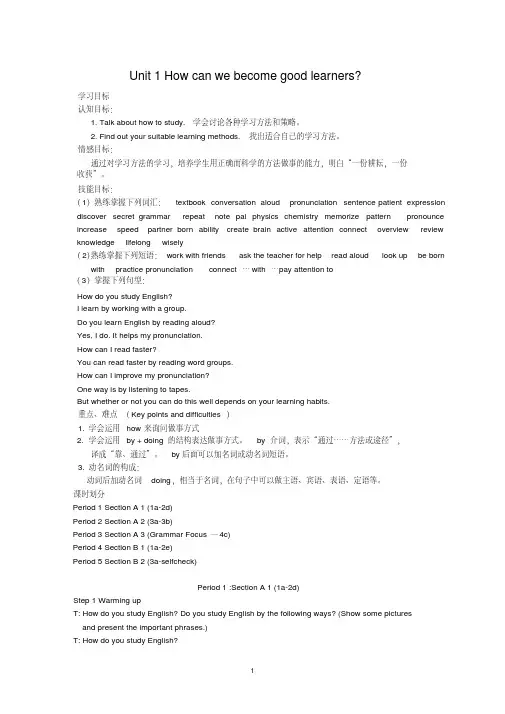
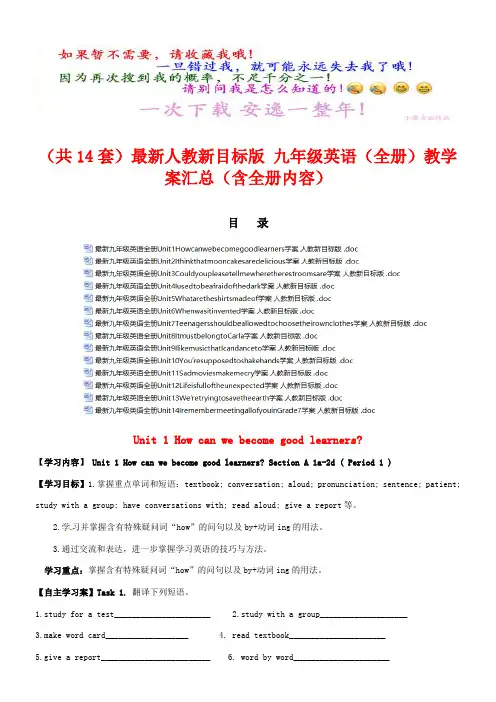
(共14套)最新人教新目标版九年级英语(全册)教学案汇总(含全册内容)目录Unit 1 How can we become good learners?【学习内容】Unit 1 How can we become good learners? Section A 1a-2d ( Period 1 )【学习目标】1.掌握重点单词和短语:textbook; conversation; aloud; pronunciation; sentence; patient; study with a group; have conversations with; read aloud; give a report等。
2.学习并掌握含有特殊疑问词“how”的问句以及by+动词ing的用法。
3.通过交流和表达,进一步掌握学习英语的技巧与方法。
学习重点:掌握含有特殊疑问词“how”的问句以及by+动词ing的用法。
【自主学习案】Task 1. 翻译下列短语。
1.study for a test______________________2.study with a group____________________3.make word card___________________4. read textbook______________________5.give a report_________________________6. word by word______________________7.大声朗读_________________________ 8.对话____________________________9.练习发音__________________________Task 2. I study for a test by____________________________________________I learn English by________________________________________________【合作学习案】e g. A: How do you study for s test? / learn English?B:I study for a test / learn English by...①—How do you study for a test? —I study by working with a group.②We usually go to school by bike.③English is spoken by many people.by的意思是“通过……的方式”时,后接;当表示“乘坐”时, 后跟;它还可以表示 , 用于被动语态,引导出动作的发出者。
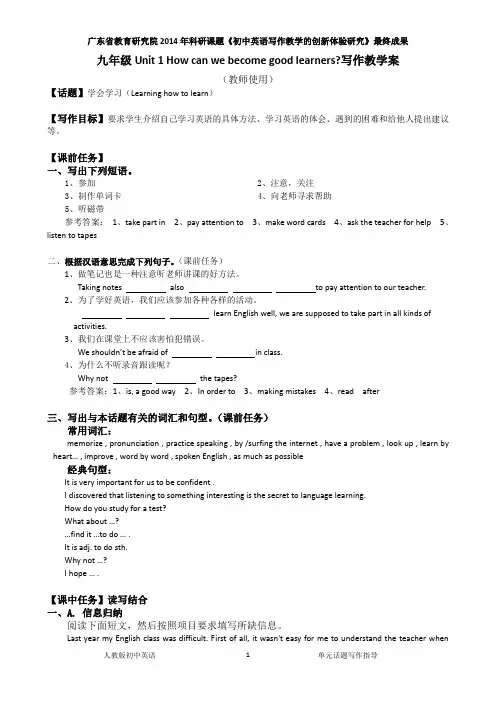
九年级Unit 1 How can we become good learners?写作教学案(教师使用)【话题】学会学习(Learning how to learn)【写作目标】要求学生介绍自己学习英语的具体方法、学习英语的体会、遇到的困难和给他人提出建议等。
【课前任务】一、写出下列短语。
1、参加2、注意,关注3、制作单词卡4、向老师寻求帮助5、听磁带参考答案:1、take part in 2、pay attention to 3、make word cards 4、ask the teacher for help 5、listen to tapes二、根据汉语意思完成下列句子。
(课前任务)1、做笔记也是一种注意听老师讲课的好方法。
Taking notes also to pay attention to our teacher.2、为了学好英语,我们应该参加各种各样的活动。
learn English well, we are supposed to take part in all kinds of activities.3、我们在课堂上不应该害怕犯错误。
We shouldn’t be afraid of in class.4、为什么不听录音跟读呢?Why not the tapes?参考答案:1、is, a good way 2、In order to 3、making mistakes 4、read after三、写出与本话题有关的词汇和句型。
(课前任务)常用词汇:memorize , pronunciation , practice speaking , by /surfing the internet , have a problem , look up , learn by heart… ,improve , word by word , spoken English , as much as possible经典句型:It is very important for us to be confident .I discovered that listening to something interesting is the secret to language learning.How do you study for a test?Wha t about …?…find it …to do … .It is adj. to do sth.Why not …?I hope … .【课中任务】读写结合一、A. 信息归纳阅读下面短文,然后按照项目要求填写所缺信息。
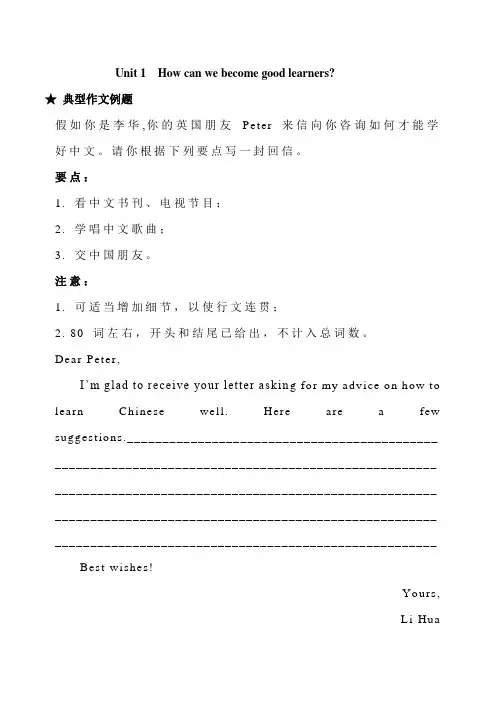
Unit 1 How can we become good learners?★典型作文例题假如你是李华,你的英国朋友Peter 来信向你咨询如何才能学好中文。
请你根据下列要点写一封回信。
要点:1. 看中文书刊、电视节目;2. 学唱中文歌曲;3. 交中国朋友。
注意:1. 可适当增加细节,以使行文连贯;2. 80 词左右,开头和结尾已给出,不计入总词数。
Dear Peter,I’m glad to receive your letter askin g for my advice on how to learn Chinese well. Here are a few suggestions.____________________________________________ ______________________________________________________ ______________________________________________________ ______________________________________________________ ______________________________________________________ Best wishes!Yours,Li Hua★思路点拨★抛砖引玉•写作中可能用到的词组:Chinese characters 汉字;sing Chinese songs 唱中文歌曲•写作中可能用到的句型:I think you should... 我认为你应该……...by doing... ……通过……★范文展示Dear Peter,I’m glad to receive your letter asking for my advice on how to learn Chinese well.Here are a few suggestions. I think you should watch TV and read books, newspapers and magazines in Chinese if possible. Besides, it is a good idea to learn and sing Chinese songs, because by doing so you’ll learn and remember Chinese characters more easi ly. You can also make more Chinesefriends. They will tell you a lot about China and help you learn Chinese.Try and write to me in Chinese next time.Best wishes!Yours,Li HuaUnit2 I think that mooncakes are delicious!★典型作文例题端午节是中国的传统节日,至今已有数千年的历史。
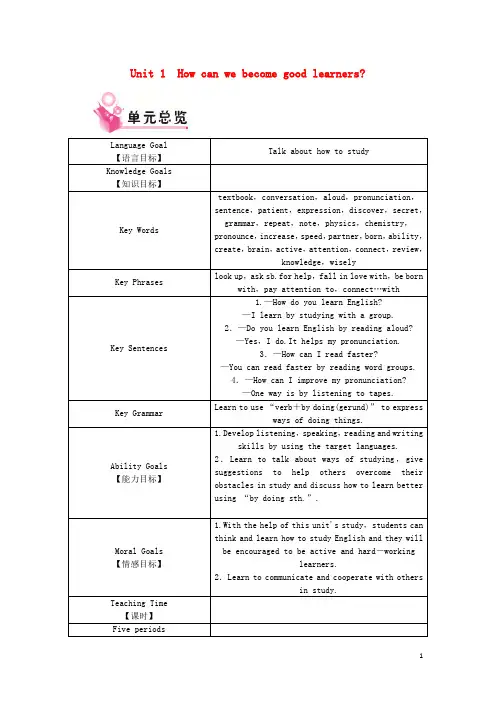
Unit 1 How can we become good learners?Language Goal【语言目标】Talk about how to study Knowledge Goals【知识目标】Key Wordstextbook,conversation,aloud,pronunciation,sentence,patient,expression,discover,secret,grammar,repeat,note,physics,chemistry,pronounce,increase,speed,partner,born,ability,create,brain,active,attention,connect,review,knowledge,wiselyKey Phrases look up,ask sb.for help,fall in love with,be born with,pay attention to,connect…withKey Sentences1.—How do you learn English?—I learn by studying with a group. 2.—Do you learn English by reading aloud?—Yes,I do.It helps my pronunciation.3.—How can I read faster?—You can read faster by reading word groups.4.—How can I improve my pronunciation?—One way is by listening to tapes.Key Grammar Learn to use “verb+by doing(gerund)” to expressways of doing things.Ability Goals 【能力目标】1.Develop listening,speaking,reading and writingskills by using the target languages. 2.Learn to talk about ways of studying,give suggestions to help others overcome their obstacles in study and discuss how to learn better using “by doing sth.”.Moral Goals 【情感目标】1.With the help of this unit's study,students can think and learn how to study English and they will be encouraged to be active and hard-workinglearners.2.Learn to communicate and cooperate with othersin study.Teaching Time 【课时】Five periodsPeriod 1 Section A(1a-2d)Period 2 Section A(3a-4c)Period 3 Section B(1a-1e)Period 4 Section B(2a-2e)Period 5 Section B(3a-3b) & Self Check本单元围绕学习的话题,讲述了学习的障碍及对应的解决方法,对学生的学习有重要意义。
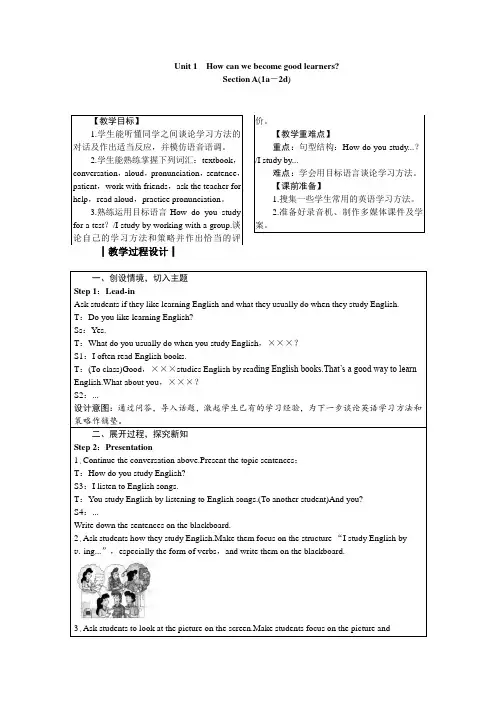
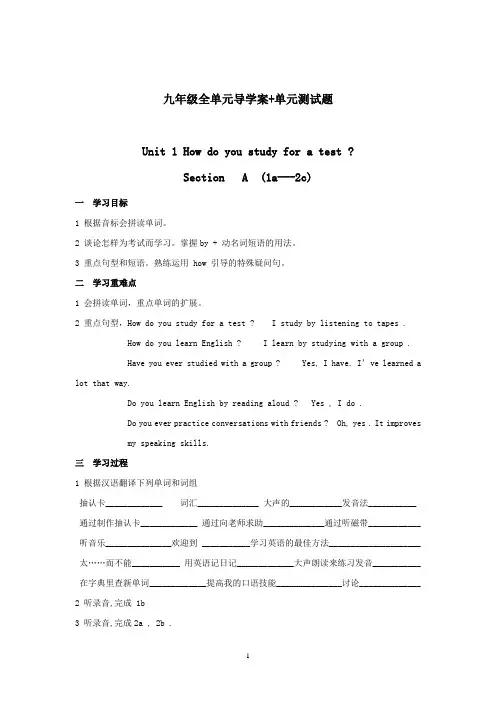
九年级全单元导学案+单元测试题Unit 1 How do you study for a test ?Section A (1a---2c)一学习目标1 根据音标会拼读单词。
2 谈论怎样为考试而学习。
掌握by + 动名词短语的用法。
3 重点句型和短语。
熟练运用 how 引导的特殊疑问句。
二学习重难点1 会拼读单词,重点单词的扩展。
2 重点句型,How do you study for a test ? I study by listening to tapes .How do you learn English ? I learn by studying with a group . Have you ever studied with a group ? Yes, I have. I’ve learned a lot that way.Do you learn English by reading aloud ? Yes , I do .Do you ever practice conversations with friends ? Oh, yes . It improves my speaking skills.三学习过程1 根据汉语翻译下列单词和词组抽认卡_____________ 词汇______________ 大声的____________发音法___________ 通过制作抽认卡_____________ 通过向老师求助______________通过听磁带____________ 听音乐_______________欢迎到 ___________学习英语的最佳方法_____________________ 太……而不能___________ 用英语记日记_____________大声朗读来练习发音___________ 在字典里查新单词_____________提高我的口语技能_______________讨论______________2 听录音,完成 1b3 听录音,完成2a , 2b .4 根据示范做类似对话练习A How do you study for a test ?B I study by working with a group . How about you ?A I study by reading the textbook.A Have you ever studied with a group ?B Yes, I have . I’ve learned a lot that way.四根据所学知识完成下列各题Ⅰ连词成句1 study, for , you , a , test , how , do , ________________________________________?2 about, what, pal , a finding pen , _________________________________________? 3too,understand,voices,hard , it’s , to , the___________________________________.4.ever,you,do,practice,with,friends, conversations ____________________________?5 improve , you , your, speaking , skills, can, by, reading , aloud , tapes , and ,to,listening_________________________________________________________Ⅱ根据首字母提示完成单词1I study English by making v_____ lists.2Tom often reads English aloud to practice p_____.3What about reading a_____ in the morning ?4It improves my speaking s _____.5He studies English by l ______to tapes.Ⅲ句型转换1 Could you tell me how I can learn English well?(改为简单句)Could you tell me _____ _____ _____ English well?2 He often does shopping at home by using the Internet .____ ____he often _____ shopping at home ?3 Why not read aloud to practice pronunciation ? (该为同义句)_______ _____ reading aloud to practice pronunciation ?4 I have ever been to Shanghai .( 改为否定句)I have ____ been to Shanghai .Unit 1 How do you study for a test ?Section A (3a___4)一学习目标1 学会拼读单词,掌握重点单词的用法。
新目标九年级英语上册学案(全册)Unit 1 How do you study for a testSection A(1a-2c)学习目标1.通过交流和表达,进一步掌握学习英语的技巧与方法。
2.掌握下列知识点:■重点词汇:f1ashcard,vocabulary,pronunciation,a1oud■重点短语:①study for②make flashcard③make vocabulary lists④ask the teacher for help⑤read aloud ⑥study with a group■重点句型:①How do you study for a test? ②What abou tlistening to tapes?■语法:by+μing的用法预习导学预习单词,完成下列各词。
1.抽认卡2.词汇3.Aloud(近义词)4.发音(名词)5.ever(反义词)6.1isten(现在分词)7.study(过去分词)8.(如何)do you study for a test?合作研讨一、重点单词与短语1.pronunciation n.发音;发音法,其动词形式pronounce【跟踪训练】(1)她认识很多法语单词,但发音不正确。
She knows a lot of French;words,but them incorrectl.2.Aloud adv.出声地;大声地例如:read aloud大声朗读【辨析】aloud/loud/loudlyaloud出声地;大声地。
常与read,cail等动词连用,loud高声地;大声地;喧闹地。
常用于talk,speak等动词之后;loudly高声地;喧闹地。
一般可以和10ud互换,但含有―吵闹‖的意思。
【跟踪训练】(2)老师要求我大声朗读课文。
The teacher asked me to the text .(3)请大声点说,以便我能听清楚。
最大最全最精的教育资源网 需要更完整的资源请到 新世纪教育网 - Unit1 How do you study for a test ?Period One Class Name【Learning objectives 】学习目标1 通过卡片学习下列词汇:flashcard,aloud,pronunciation,skill,voice 能读会默。
2 小组合作练习目标语言How do you study for a test? I study by doing … 【Important leaning points 】学习重点运用by doing 谈论学习方式 一、自主学习1、预习熟记本课单词flashcard,aloud,pronunciation, skill,voice, improve, vocabulary, list 2, 完成下列短语和朋友一起学习 制作抽认卡 看课本 制作词汇表 听磁带 向老师寻求帮助 3、理解下列对话,并利用上面词组练习: A :How do you study for a test? B :I study by working with a group. A :How does Bob study for a test? B :I study by marking flashcards. A :Do you learn by.........? B :Yes,I do. /No, I don't. 4 、听录音,完成1 b 二、合作探究根据下面的句子,总结by 的用法和含义: 1、I have to be in bed by 10 o'clock. 2、There is a tree by the river. 3、I go to work by bus.4、The boy is sent to the hospital by a kind man.5、You can learn English by working with friend 三.能力提升1、理解2a 、2b 中的句子,找出下列短语:看英文光碟 和朋友连交际大声读 练习发音 小组学习 说的技能 做.........太难 2、听录音,完成2a 、2b 四、当堂检测 (一)补全单词:1、It's a good way to read a2、The boy often l up the words in the dictionary.3、Do you have an i about weekend?4、K a diary helps to write English every day.5、The girl often learn by a the teacher for help.6、What about reading about to practise p ? (二) 句型转换1、I study art by listening to music.2 、Mary plays computer games by asking friends for help. (一般疑问句) 3、I have learned a lot by watching videos. (一般疑问句)4、What about (practice) conversation with friends ?5、You should read (loud) to learn English.6、Tom wants (improve) my physics. 五 、作业布置1、总结 too… to … 用法最大最全最精的教育资源网 需要更完整的资源请到 新世纪教育网 - 2、预习P4 3a How do you learn best ? 【课后反思】Unit1 How do you study for a test ?Lesson: Period Two Class Name 【Learning objectives 】学习目标1. 小组提问,掌握下列单词,specific, memorize, grammar, differently, frustrate, frusrating, quickly, add, not at all, excited, end up.能读会拼写。
人教版新目标九年级英语第1-15单元全套教案Unit 1 How do you study for a test? (1)Unit 2 I used to be afraid of the dark. (4)Unit 3 Teenagers should be allowed to choose their own clothes (11)Unit 4 What would you do ? (30)Unit 5 It must belong to Carla. (38)Unit 6 I like music that I can dance to (58)Unit 7 Where would you like to visit? (83)Unit 8 I‟ll help clean up the city parks. (112)Unit 9 When was it invented? (141)Unit 10 When was it invented? (145)Review of units 6~10 (166)Unit 11 Could you please tell me where the restrooms are (177)Unit 12 You‟ re supposed to shake hands (201)Unit 13 Rainy days make me sad. (225)Unit 14 Have you packed yet? (250)Unit 15 We‟re trying to save the manatees! (276)Unit 1 How do you study for a test?Page 2, 1a, 1b, 1cPeriod 1教学目的:Talk about how to study.Learn the use of “by doing something”重点难点:Useful expressions-How do you study …?I study by doing …教学工具:courseware教学步骤:Step 1. Self-introductionThe new term has come. Ask the students to introduce themselves to the others and the teacher. Then ask what they did in the summer holiday. If possible, ask how they did that.Help the students use the construction “I …by doing…”.Explain “by”.Step 2. DiscussionHave the students say what they think of English.Then tell each other how they study for an English test. See the phrases shown in the courseware, which is similar to 1a. Remind them to use “by doing…”Step 3. 1a. Checking the ways you studyAsk students to finish the task. They can add something else.Step 4. 1b.ListeningListen to the listening stuff of 1b, which is recorded in the courseware (convenient to be repeated). Finish the task.Then the teacher asks, ”How did Mei/ Pierre / Antonio study?” Have some students give the answers, i.e. repeat the sentences by using “by doing”Step 5. 1c. Making dialoguesWork in pairs or groups. Discuss first. Then make a short dialogue.Have the students share their work.Step 6. Writing.See the courseware. Fill in the blanks. Write down the answers on a piece of paper. Ask students to read their work.Period 2教学内容:Page 3, 2a, 2b, 2c and the grammar focus.教学目的:Talk about how to learn English.Consolidate the use of “by doing something”重点难点:Useful expressions-Do you study …by doing…?Yes /No... (reason).教学工具:courseware教学步骤:Step 1. RevisionMake a dialogue between the teacher and some students. Ask whether they like English, then tell the reason. Ask how they learn English.Step 2. 2a. ListeningSee the courseware. Explain any difficult points. Listen to the stuff, and check the answers.Have students repeat some main sentences, ready to practice dialogues.Step 3. 2b.ListeningFinish the task.Step 4. 2c.Doing a pairworkGive students some time to talk about the contents of 1a and 1b.See the courseware. Some patterns will help, such as “Do you.../ What about.../ Have you ever.../ How do you…?” and the possible answers.Share their dialogues.Step 5. Make a conversation.Ask students to tell the others their own experience about studying English by working in pairs or groups. Then make a conversation respectively.They can also use indirect speech, such as “... says she learns ... by ...”etc.Step 6. SummaryPoint out the main contents learnt these two days.英语(九年级)教学设计(3)课时:Period 3教学内容:Page 4, 3a, 3b,教学目的:Practice reading.Learn useful expressions.Practice writing.重点难点:v + ing phrase used as a subjectfind / think + O + OC教学工具:courseware教学步骤:Step 1. Make a statement.Firstly the teacher asks a student a question and the student answers. Ask several.Then have many more students make a statement one by one to introduce how he / she learns English.Step 2. 3a. ReadingFirstly, read to the tape aloud. Pay attention to the pronunciation and the intonation.Read again, underline the useful expressions.Read once more. Fill in the chart. Check the answers.Step 3. Learn the useful expressions.1. Ask students to say the useful expressions they have underlined.2. Add if the students miss some.3. Learn some grammar:Ask a student to tell us how many sentences, which include v-ing phrase as a subject, are in the text. Point out the constructions. Explain why they are used.Teach the structure ”find / think + O + OC” and other grammar.Step 4. 3b. PairworkGive the students a little time to prepare a role play.Ask some to share their work with the whole class.Step 5. ConsolidationIn Chinese, teacher says some important phrases from the text. Have the students tell us the English ones as quickly as possible.Unit 2 I used to be afraid of the dark.The First PeriodTeaching Contents: Section A 1a,1b,1c,2a,2b,2cStep I Organization of class1.Greeting2.Warming upStep II Presentation1.Words CompetitionShow the class many words of appearance and personality. Get them to put the words in the right place.2.Guess: Who is the boy?Show the class some information about Harry Potter:He is a boy. He is not tall. He has curly hair. He is easygoing. He is very smart. He can see strange things and so on.3.Show two photos of the teacher — five years ago/ now. Ask the students some questions: What did I look like five years ago? What do I look like now?4.Introduce the new conversations in Unit 2.I used to be fat. I am thin now.I used to have long hair. I have short hair now.I used to play basketball. I play ping-pong now.Step lIl Teaching Tasks1.Task One (Pairwork): Listening to the tape(1) Show the students two pictures and say something about the people in the picture.(2) Listen to the tape. Then fill in the blanks in lb,2a,2b.2.Task Two (Groupwork): Describing different persons(1) Show the students a set of pictures, such as a movie star, a sportsman, a teacher.(2) Get the students to discuss in groups and take notes, such as: Jacky Chan used to have big eyes, but now he has small eyes.(3) Ask two or three groups to present their answers.(4) Which group does best?3.Task Three (Team work): Survey(1) Ask the students to bring two photos of themselves to class.(2) Get the students to talk about the changes of their classmates and write down the key words in the form.(3) Let the team leader present their survey results.(4) Who has changed most in your team?(5) Which is the best team?Step IV SummaryStep V Assign homeworkWrite a composition about your classmate before and now.The Second PeriodTeaching Contents:Section A 3a,3b,4Step I Organization of class1.Greetings2.Singing an English songStep II Revision1.Revise the conversations that the students learned in the first period. Ask them to talk about some pictures.2.Check the homework. Talk about what one person used to be likeand she/ he is like now.Step IIl Presentation1.Show the class a picture of a big dog,then introduce the new conversations in 3a:I used to be afraid of big dogs./I‟m still afraid of big dogs.2.Ask the students some questions like this:What did you use to be afraid of?/Are you still afraid of...?Step IV Teaching Tasks1.Task One (Pairwork):Match the pictures with the phrases.(1) Show the students six pictures about the phrases in 3a.(2) Ask the students to talk about the pictures in pairs and match them.2.Task Two:Put checks in the first two columns.(1) Show the students the first two columns about “I”, then get themto put checks.(2) Ask a group of students to read out their answers like this:I used to be afraid of... / I‟m still afraid of...3.Task Three(Pairwork):Put checks in the last two columns.(1) Show the students the last two columns about “My Partner”.(2) Get the students to practice the dialogs in 3b.(3) Put checks in the columns.(4) Ask several pairs to present their answers.(5) Choose the best pair.4.Task Four(Groupwork): A survey(1) Show the students a form about the activities.(2) Get the students to fill in the blanks about “I”.(3) Get the students to ask their classmates and fill in the blanks about “My classmate”.(4) Ask the students to ask questions like this:What did you use to eat?/ What do you eat now?(5) Let two or three groups present their results.(6) Which is the best group?5.Task Five (Teamwork): How has Zhongshan(中山)changed?(1) Show the class several pictures of Zhongshan city — Past and Now.(2) Get the students to talk about the pictures and write down the key words on the paper.(3) Ask two or three team leaders to present their opinions.Step V SummaryStep V IAssign homeworkGet the students to write a composition about“Zhongshan has changed a lot!”The Third PeriodTeaching Contents: Section B la, lb, 2a, 2b, 2c, 3aStep I Organization of classWarming upStep II Checking up the homework1.Ask two students to read out their compositions (Zhongshan has changed a lot!).2.Get students to discuss the compositions.Step III Presentation1.Show the class four pictures in la.2.Ask students to describe what is happening in each picture:A girl is exercising in gym class.A girl is painting a picture.A boy is singing.A boy is looking at some insects.3.Ask students to check the things they liked to do when they were very young.Step IV Teaching Tasks1.Task One (Pairwork): I used to like to...(1) Point out the lines under the picture in lb.(2) Ask students to write down different things that they used to like to do.(3) Get students to discuss the answers in pairs, then ask some students to read out their sentences.2.Task Two: Listening practice (2a, 2b)(1) Ask students to listen to a dialog between a boy and a girl.(2) Ask students to check the sentences on the list that they hear on the recording.(3) Check the answers in 2a.(4) Play the recording again. Ask students to fill in the blanks with the words they hear.(5) Correct the answers in 2b.3.Task Three (Pairwork): Making up dialogs(1) Teach students the conversation in 2c.(2) Say some sentences using Did you...? and the answers Yes, I did./ No, I didn't.(3) Ask students to make similar dialogs in pairs.(4) Call on different pairs to read out their conversations to the class.4.Task Four (Groupwork): A debate(1) Show students a survey that the teacher did before the class.(2) Get them to discuss their hairstyles in the past and now like this:I used to have ... hair, but now I have ... hair.(3) A debate──Should students choose their own hairstyle? Why orwhy not?5.Task Five: Reading Practice(1) Get students to read the story in 3a.(2) Ask students to complete the chart about Rose Tang then and now.(3) Check the answers.Step V SummaryStep VI Assign homework1.Ask students to Complete the letter in 3b (How I've changed!).2.Get students to talk to their parents and fill in the chart in 4a.The Fourth PeriodTeaching Contents: Section B 3b, 3c, 4a, 4b, Self Check.Teaching Procedures:Step I Organization of classStep II Checking up the homework1.Ask some students to read out the letter (How I've changed!).2.Get students to discuss their answers and choose the best one.Step lII Teaching Tasks1.Task One (Pairwork)Ask students to finish 4a before the class-Talk to their parents and fill in the chart in 4a.2.Task Two (Groupwork)(1) Ask students to talk about the contents in 4a with their classmates.(2) Choose two groups to present their answers.3.Task Three (Teamwork): How has Yu Mei changed!(1) Get students to talk about the pictures in Self Check 2.(2) Ask students to use the drills in Unit 2 to describe the pictures.(3) Ask students to write down a composition about Yu Mei on the paper.(4) Ask two or three of them to read out their compositions in class.(5) Choose the best one.4.Task Four (Teamwork): A survey── How has our life changed?(1) Show students some information in Unit 2.(2) Ask students to talk about how their life has changed since primary school and fill in the blanks in the survey form.(3) Ask the team leaders to present their survey results.(4) Choose the best team.5.Task Five: A composition about the changes in our life(1) Get students to write a composition on the paper.(2) Ask students to exchange their compositions and correct them.(3) Show the class one or two good compositions.Step IV SummaryStep V Assign homeworkFinish Part One of Self Check.The Fifth PeriodReading—E-mail EnglishStep I Organization of class1.Ask the whole class some questions:What subjects do you study at school?What subject do you like best? Why?2.Talk about the usage and importance of English.Step II Introducing E-mail EnglishWhat does e-mail English mean? What is it used for?Step III Teaching Tasks1.Task One (Pairwork)(1) Ask students to talk about the words in Part 1.(2) Ask students to fill in the chart with their partners and try to think of some more.(3) Check their answers.2.Task Two: Matching(1) Get the students to read the whole article as quickly as they can.(2) Try to finish the exercise in Part 2—Match each paragraph with its main idea.(3) Check the answers.3.Task Three: Deep Comprehension(1) Tell the students to read the article more carefully again.(2) Try to finish the exercise in Part 3—Match the words and expressions with their meanings.(3) Try to finish the exercise in Part 4—Find words or phrases for1-5.(4) Check their answers.4.Task Four (Pairwork)(1) Ask the students to finish Part 5 in pairs.(2) Write a message to their partner using the e-mail English in this reading or other e-mail words.(3) Let some students read out their e-mails.(4) Choose the best one.Step IV SummaryStep V Assign homeworkWrite a reply to your partner, using the e-mail English as much as possibleUnit 3 Teenagers should be allowed to choose their own clothesPeriod 1教学目标1. Knowledge Objects(1) Key Vocabulary: allow, drive, pierce, driver, license, silly(2)Structure: should be allowed to2. Ability Objects(1)Train students‟ listening skill and communicative competence.3. Moral ObjectStudents should do what they are allowed to do and avoid doing what they aren‟t allowed to do.教材分析1. Teaching Key PointsTarget languageThe structure:should be allowed to 2. Teaching Difficult PointThe structure: should be allowed to实施教学过程设计Step ⅠRevisionShow the following on the screen by a projector.go out at nightcollect stampsbe alone at homeask the teacher questionsdrink milkread English magazineseat eggswrite lettersAsk students to make sentences with the phrases above using the structure used to. Both statements and questions are acceptable. Step Ⅱ1aThis activity focuses on vocabulary words and the structure "should be allowed to."Show the new words on page 18 on the screen by a projector.allow v.允许,准许drive v.驾驶;驾车pierce v刺穿;刺破license(=licence) n.执照;许可证silly adj.愚蠢的;傻的Unit 3 Teenagers should be allowed to choose theirown clothesPeriod 2教学目标1. Knowledge Objects(1) Key Vocabulary:earring, instead of(2) Target Language2. Ability Objects(1)Train students‟ listening skill.(2)Train students‟ communicative competence.3. Moral ObjectYou should have the courage of your opinions.教材分析1. Teaching Key PointTarget language2. Teaching Difficult Point Agreement and disagreement实施教学过程设计Step ⅠRevisionPlay a game to review the structure be used to do.Write sentence starters on separate pieces of paper as follows:I‟m allowed to……;My brother isn‟t allowed to…;Students should not allowed to…;Put the papers in a paper bag.Put students into teams. Each team chooses a slip from the bag.Set a time limit of five minutes. Each team writes as many sentences and reasons as they can. When time is up, collect their answers. Each team gets one point for each correct sentence and one point for each correct reason. The team which gets the most points wins the game.Step Ⅱ2aThis activity provides practice understanding the target language in spoken conversation.Point to the picture and ask students what is happening. Elicit answers from students.T: What‟s the boy doing?S s: He is working part-time.T: What are the girls doing?S s: They are talking.Point to the statements in the chart.Have students look them through. Answer any questions students raise to make sure they comprehend each sentence.Point to the lists of responses. Say, You are to hear Kathy and Mollyhaving a conversation. Kathy will make some statements. Listen and check what Kathy thinks and circle Agrees, Disagrees or Doesn‟t know to show what Molly thinks. Point out the sample answers,Play the recording for the first time. Students only listen.Play the recording again. This time students listen and check what Kathy thinks and circle if Molly Agrees, Disagrees or Doesn‟t know.Check the answers.AnswersKathy The following sentences should be checked:1,2,3,4,5Molly 1. Disagrees 2. Agrees3. Doesn‟t know4. Disag rees5. Doesn‟t knowStep Ⅲ2bThis activity provides practice in understanding the target language in spoken conversation.Point to the list of reasons in the box. Invite a student to read them to the class.Say, You are to hear the same conversation again. This time number their reasons in the correct order as you hear on the recording. Point out the sample answers.Play the recording again. Students listen and number the reasons.Check the answers.AnswersThe correct order should be:4,1,5,2,3Step Ⅳ2cThis activity provides oral practice using the target language.Read the instructions to the class. Ask students for suggestions that teenagers should and should not be allowed to do.Remind them to look back at Activities 1a and 2a. For example, students might say,Teenagers should be allowed to make their own decisions. Teenagers above seventeen should be allowed to join the army. Teenagers shouldn‟t be allowed to stay up…point to the sample conversation. Invite a pair of students to say it to the class,completing the sentences.S A: Do you think teenagers should be allowed to work part-time?S B: Yes, I think they should learn to be independence.Ask another pair to demonstrate a new conversation.S A: Do you think teenagers should be allowed to drive?S B: No, I don‟t think they are old enough to drive.Have students work in pairs. Move around the room listening in on various pairs and offering any help they may need.Check the answers by asking different pairs to say their conversations to the class. Note: Answers will vary.Step ⅤGrammar FocusAsk different pairs of students to say the statements and questions. Write them on the blackboard. Check how well students understand each sentence by asking a student to repeat it in his/her own words. Point out I disagree, I agree and Do you think …? If necessary, give students more practice.Grammar noteDon‟t explain the structure “be allowed to” to students. It‟s too complex for students to understand at this point. So it can be studied almost as if it were a vocabulary item at this level.Step ⅥSummary and HomeworkSay, In this class, we‟ve done a lot of listening and speaking practice using the target language. And we‟ve also talk about agreement and disagreement. Review the grammar box to get a further understandingof the target language.课题Unit 3 Teenagers should be allowed to choose their own clothes Period 3教学目标1. Knowledge Objects(1) Key Vocabulary:stay up(2) Target Language2. Ability ObjectTrain students‟ integrating skills.3. Moral ObjectStudents may think parents should allow them more freedom. In fact, they are weak in telling the right from wrong. So accept parents‟ advice.教材分析1.Teaching Key PointsTalk about what oneself is or isn‟t allowed to do using the target language.Ask for what someone is or isn‟t allowed to do using the target language.2. Teaching Difficult PointTrain students‟ integrating skills by task-based activities.实施教学过程设计Step ⅠRevisionPlay a game to review the structure be or be not allowed to.Divide the class into groups. Each group is asked to make a list of school rules.The group which writes down the most rules within five minutes wins the game.Step Ⅱ3aThis activity provides reading and writing practice using the target language.Point to the picture and ask students to describe it.Invite a pair of students to read the conversation to the class.Call students‟ attention to the chart. Say, You are to read the conversation again and write Sun Fei‟s and Wu Yu‟s rules in the chart. Ask a student to read the sample answers to the class.Get students to complete the chart individually. Remind them to use "Don‟t" and "You can".As they are working this, move around the room answering any questions students raise about the conversation and offering language support as needed.Check the answers.AnswersSun Fei: You have to be home by 10:00 p.m.Wu Yu: You have to stay at home on school nights.You can go to the movies with friends on Friday nights.You can go shopping with friends on Saturday afternoon.You can choose your own clothes.Don‟t get your ears pierced.Step Ⅲ3bThis activity provides listening and speaking practice using the target language. Focus attention on the conversation. Ask a pair of students to read it to the class, completing the last sentence.S A: What rules do you have at home?S B: Well, I‟m not allowed to go out on school nights. How about you?S A: I‟m not allowed to go out on school nights, either. But I can study at a friend‟s house.Write the conversation on the blackboard.Say, Please cover the conversation in Activity 3a. Using the information in the chart, make new conversations in pairs.Get students to complete the work in pairs. Move around the room checking progress and offering any help students need.Ask several pairs to share their conversations with the class. Step Ⅲ3bThis activity provides listening and speaking practice using the target language. Focus attention on the conversation. Ask a pair of students to read it to the class, completing the last sentence.S A: What rules do you have at home?S B: Well, I‟m not allowed to go out on school nights. How about you?S A: I‟m not allowed to go out on school nights, either. But I can study at a friend‟s house.Write the conversation on the blackboard.Say, Please cover the conversation in Activity 3a. Using the information in the chart, make new conversations in pairs.Get students to complete the work in pairs. Move around the room checking progress and offering any help students need.Ask several pairs to share their conversations with the class. Step ⅣPart 4This activity provides reading, writing, listening and speaking practice using the target language.Read the instructions to the class.Call students‟ attention to the chart. Set a time limit of one minute.Students read the headlines at the top and at the sides.Demonstrate how to fill in the chart with a student.T: Do you have to go home after school, Wei Ming?W: Yes,I do.T: Are you allowed to stay up until 11 : 00 p.m.?W: No, I‟m not.T: …Tell students where to write Wei Ming in the chart.Say, You are to ask different students in the class and find three people who have to follow each of the rules in the chart.Ask students to complete the chart. Allow them to stand up and move around the room. Walk around the room checking progress and offering help with pronunciation and writing.Ask several students to tell the class what they learned. For example, a student might say, Wei Ming has to go home after school. Liu Chang is allowed to stay up until 11:00 p.m. and so forth.Review the task. Ask, who has to go home after school? Count the hands and let students keep a record. Do the same approach with the other items. Discuss the results with the class.Optional activityAsk students to create a chart similar to the one in Activity 4. Then make a different list of rules from the ones in the book. Get them to complete the activity by going around the class and filling in the chart. StepⅤSummary and HomeworkSay, In this class, we‟ve learned to talk about oneself is or isn‟t allowed to do and a sk for someone is or isn‟t allowed to do.教学反思课题Unit 3 Teenagers should be allowed to choose their own clothes Period 4教学目标1. Knowledge Objects(1) Key Vocabulary:be strict with, take a test, pass a test, fail a test(2)Target Language2. Ability Objects(1) Train students‟ listening skill.(2) Train students‟ ability to talk about agreement and disagreement.3. Moral ObjectIt‟s good manners to be on time.教材分析1. Teaching Key PointsReview some key vocabulary words and target language. Talk about agreement and disagreement.2. Teaching Difficult PointTalk about agreement and disagreement.实施教学过程设计Step ⅠRevision(1)Check the homework.(2) Competition: Write "are allowed to" and "aren‟t allowed to" on the blackboard, Divide the class into groups.Each group is asked to write down as many things as they can think of about what teenagers are or aren‟t allowed to do. See which group can think of the most items for each category.StepⅡ1aThis activity reviews the use of always, sometimes, usually and never.Point to the picture. Ask students to describe what is happening in the picture.Help students to say, The boy is late for class. Invite a student to read the four questions in the box to the class.Read the instructions and remind students of the exact meanings of the adverbs of frequency.Say, Please write A after things you always do, U after things you usually do, Safter things you sometimes do and N for things you never do.Get students to finish the task on their own.Answers to this activity will vary.Step ⅢlbThis activity provides oral practice using the target language.Point out the sample conversation. Ask a pair of students to say it to the class.S A: Do you ever get to class late?S B: Yes, I sometimes get to class late.Say, Talk with your partner about your answers in Activity 1a.As the pairs work together, walk around the room offering help if necessary.Ask several pairs to share their conversations with the class. Step Ⅳ2aThis activity provides practice in understanding the target language in spoken conversation.Point out the four items in Activity 1a.Say, You will listen to a conversation and circle the things on the list that you hear.Play the recording for the first time. Students only listen.Play the recording a second time. This time students listen and circle the things that they hear.Check the answers.AnswersCircled items: 1,4StepⅤ2bThis activity provides listening practice using the target language.Point to both the numbered and lettered lists of item in the box.Point out the sample answer. Read the sentence "Peter is going to fail a math test to the class."Say, I‟ll play th e same recording again.You are to match the sentence parts as you hear on the tape.Play the recording for students to do the activity.Check the answers.Answers1. c2. e3. a4. b5. dStep Ⅵ2cThis activity provides oral practice using the target language.Call students‟ attention to the statements in the box. Say them to the class.Ask three students to read the sample conversation to the class, completing the sentences.S A:I think Peter should be allowed to take the test later.S B:I don‟t agree.S C:I think the school has to have rules.Write the conversation on the blackboard.Divide the class into groups of four. Say,Now discuss the statements with your group.。
新目标九年级英语全册1-15单元重点词组Unit 11. 通过做某事 by doing2. 做完某事 finish doing3. 在。
的帮助下with the help of/ with one’s help4. 把。
和。
比较compare…with/to…5. 犯错 make mistakes (in)6. 以后,随后 later on7. 没关系 it does n’t mattert 8. 害怕做某事 be afraid to do/ be afraid of doing9. 嘲笑 laugh at 10. 做笔记 take notes11. 在。
有麻烦(困难)have trouble/problems (in )doing12. 查找 look up 13. 组成,编造 make up14. 处理,应付 (how)deal with /(what) do with 15. 将。
视为,当成regard…as…16. 对。
生气 be angry with/ be mad at 17. 逝去,过去 go by18. 尽力做某事try one’s best to do sth 19. 中断,突然中止 break offUnit 21. 过去经常做某事used to do2.习惯于做某事be/get used to doing3. 被用于做某事be used to do4. 害怕。
be terrified of doing5. 入睡go to sleep/fall asleep6. 和。
闲聊chat with sb7. 最后;终于in the end 8. 在。
末尾,尽头at the end of9. 到。
末为止by the end of (过去完成时)10. 做决定;下决心make a decision to do/decide to do11. 让。
吃惊的是to one’s surprise 12. 即使,尽管even though/even if13. 不再not longer/not more 14. 对。
新目标九年级英语上册学案(全册)Unit 1 How do you study for a testSection A(1a-2c)学习目标1.通过交流和表达,进一步掌握学习英语的技巧与方法。
2.掌握下列知识点:■重点词汇:f1ashcard,vocabulary,pronunciation,a1oud■重点短语:①study for②make flashcard③make vocabulary lists④ask the teacher for help⑤read aloud ⑥study with a group■重点句型:①How do you study for a test? ②What abou tlistening to tapes?■语法:by+μing的用法预习导学预习单词,完成下列各词。
1.抽认卡2.词汇3.Aloud(近义词)4.发音(名词)5.ever(反义词)6.1isten(现在分词)7.study(过去分词)8.(如何)do you study for a test?合作研讨一、重点单词与短语1.pronunciation n.发音;发音法,其动词形式pronounce【跟踪训练】(1)她认识很多法语单词,但发音不正确。
She knows a lot of French;words,but them incorrectl.2.Aloud adv.出声地;大声地例如:read aloud大声朗读【辨析】aloud/loud/loudlyaloud出声地;大声地。
常与read,cail等动词连用,loud高声地;大声地;喧闹地。
常用于talk,speak等动词之后;loudly高声地;喧闹地。
一般可以和10ud互换,但含有“吵闹”的意思。
【跟踪训练】(2)老师要求我大声朗读课文。
The teacher asked me to the text .(3)请大声点说,以便我能听清楚。
Please so that I can hear you clearly.(4)不要这么大声说,婴儿在睡觉。
Don't so.The baby is sleeping.3.asksb.for…向某人请求例如:ask the teacher for help向老师请求帮助(拓展)ask sb.to do sth.请求某人干某事ask sb.not to do sth.请求某人不要干某事【跟踪训练】(5)他们向我求助,They me help.4.too... to...太……而不能……【拓展】too...to...可以与so...that(如此……以至于……)或Enough to do...(足够……以至于……)转换。
【跟踪训练】(6)The problem is so difficult that I can’t work it out。
(同义句转换)The problem is difficult work out.5.a lot表示程度,作状语,意为“很;非常”【拓展】a lot of=lots of许多;很多。
修饰可数名词复数与不可数名词。
【跟踪训练】(7)我有许多有趣的书。
I have interesting books.二、重点句型与语法■句型What about reading a1oud to practice pronunciation?通过大声朗读来练习发音怎么样?【精解】What/How about...?用来征求意见或询问有关情况,意为“……怎么样”,about后跟名词、代词或动名词。
【拓展】提建议的其他表达方式有:(1)Let’s do... (2)Shall we do...?(3)Why don't you.../Why not do...?(4)Would you mind doing...?(5)You should...(6)You’d better(not)do...·【跟踪训练】(8)出去散散步好吗?going out for a walk?(9)那个电视剧怎么样?the TV play?(10)我是北京人,你呢?I am Beijinger. you?■语法“by+υing"短语“by+υing"短语的含义是“通过……;凭借……”,其中by为介词,后面常接动名词短语,表示通过做某事而得到某种结果;在句中常用作方式状语,表示的方法、手段等比较抽象。
例如:The old woman makes a living by collecting and selling wastes.那个老妇人以收废品和卖废品谋生o【跟踪训练】(11)—How do you study English So well?—reading 1ots of books。
A.ToB.OfC.AtD.By当堂检测Ⅰ. 用所给单词的适当形式填空1.We study by (work)with a group.2.It is agreat way (1earn)a 1anguage.3.What about (read)a1oud (practice)pronunciation and intonation?Ⅱ.根据汉语提示完成句子4.Have you ever (和朋友一起练习对话)friends?5.I study English (通过制作)f1ashcards.6.(怎么样)1istening to tapes?7.这个问题太难了,我理解不了。
It's hard me this question.8.朗读能提高你的口语。
can your spoken English.课后练习1.根据句意及首字母提示完成单词1.I can’t get the p of the word right.2.Reading a in the morning is a good way to 1earn English well.3.He 1earns English bymaking v 1ists。
4.Do you 1earn English by w English-1anguage videos?5.I often listen to tapes to i my listening skills。
Ⅱ.阅读理解ManyChinese students don’t paymach attention to(注意)spoken English at school.They think it necessary to practicespeaking English in class,but not out of class.Here is a story to show you how important it is to speak the Eng1ish language freely in daily life.A foreigner once got hungry and went into a restaurant in London.He sat down at a table.When the waiter came,he opened his mouth,put his nngers into it and took them out again in Order to express that he wanted something to eat forhe could not speak English.The waiter soon brought a cup of tea.The man shook(摇动)his head。
The waiter then took away the tea and brought a cup of coffee.The man shook his head again.He tried again and again,but he wasn’t able to make the waiter understand him.Finally,nother man came in.He spoke English clearly and fluently.In a few minutes,there was a large plate of meat and vegetables on the table before him.Sl you see a man often goes hungry if hedoesn’t master(掌握)a foreign language.根据短文内容,判断下列句子正(T)误(F)()6.Chinese students pay little attention to spoken English.()7.The students only practice speaking English in class.()8.The story happened in a restaurant in New York.()9.The man wanted to eat something because he was hungry.()10.Another man spoke English very well.Unit 1Section A (3a-4)学习目标1.掌握学好英语更多的方法。
2.掌握下列知识点:■重点词汇: memorize,differently,frustrate,frustrating,quickky■重点短语:①the best ways to 1earn more English ②for example③have fun ④not at all ⑤do a survey ⑥end up ⑦get excited about■重点句型:①She said that memorizing the words 0f pop songs also helped a little.②He’s been learning English for six years and really loves it.■语法:动名词作主语、宾语预习导学Ⅰ.预习单词,完成下列各词的变化。
1.different (adv.)(n.)2.frustrate /(odj.)3.memorize (n.)4,quick (adu.)5.help (odj.)6.success (odj.)Ⅱ.根据SectionA,3a内容回答下列问题。